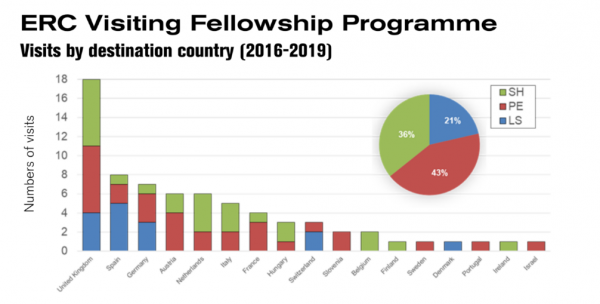How does the ERC help unlock the potential of countries that lag behind?
The European Research Council (ERC) is taking several measures to increase participation in its grant competitions, particularly in countries that historically perform poorly in ERC grant competitions.
One such measure is the ERC Visiting Fellowship Programme, launched in 2016. The program encourages national or regional authorities and organizations to set up visiting fellowship schemes to fund potential candidates in ERC calls to visit current ERC grantees’ teams for up to six months. This initiative enables them to strengthen their research profile and vision in an internationally competitive research environment before applying for an ERC grant. National funding agencies cover the travel and salary costs of the fellows for the duration of the visit, while the ERC facilitates the matching.
Hosts await visitors
Although up to 1,100 current grantees were open to host such a research visitor following ERC calls for expression of interest, the interest from potential visitors has been less than expected. Additionally, the program was suspended for two years due to the COVID-19 pandemic, and only 70 visits took place from 2016 to 2019. However, when these visiting fellows later submitted their ERC proposals, they fared much better than the average for countries with low participation rates.
More than 750 ERC mentors ready to help
In 2021, the ERC launched another measure called the Mentoring Initiative. The program identifies a pool of mentors among ERC grantees and former proposal evaluators who are available to provide training, scientific feedback, and other forms of mentoring to ERC applicants. The program aims to alleviate the problem faced by local and regional support offices that often struggle to identify international experts to provide coaching and advice for ERC grant applicants. Twelve organizations in nine countries currently participate in this initiative. Following the first call for mentors, the ERC identified more than willing 750 grantees and former panel members. Different organizations use various mentoring modalities, mostly one-on-one remote mentoring, with some mentors helping with mock interviews, while others pre-screen proposals or review CVs.
Reaching out for talent
The ERC is also working, often in cooperation with national agencies, to increase awareness of its funding opportunities and to encourage researchers in low-participation countries to apply for ERC funding. A vital part of the ERC’s communication strategy is to regularly organise information sessions, workshops, and webinars in these countries.
Have ERC activities improved the situation? The problems in the so-called widening countries are complex, and no single measure or actor can claim a decisive role in any change. However, both visiting fellowships and mentoring programs seem to be appreciated by the ERC’s national counterparts, and limited data suggest that these measures have had some positive impact. When analysing the success rates for widening countries, we see a positive difference of about 2 percentage points between Horizon 2020 and old FP7 calls (the EU’s main instruments for implementing its common scientific and innovation policy). In the Czech Republic, Portugal, Turkey, and Slovenia, this difference was stronger, at about 4 percentage points.
The ERC’s activities are carried out in the broader context of EU policy. Widening Participation and Spreading Excellence actions under Horizon Europe, supported by a significant budget, aim to strengthen successful participation in transnational research and innovation processes, promote networking, and provide access to excellence. However, the European Court of Auditors, in its 2022 assessment, found that “a real shift depends largely on national governments, which must make R&I a priority to ramp up investment and reforms.”


